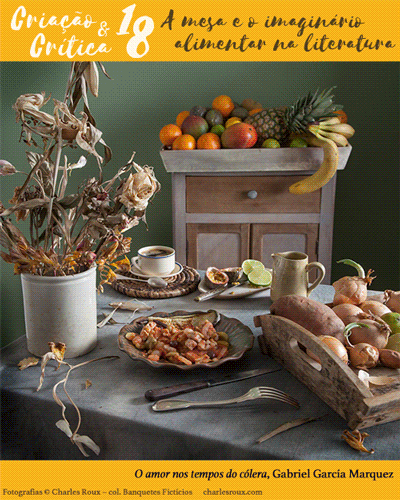The Gastronomic Prose of Pellegrino Artusi: culture, taste and distinction in a 19th century cookbook
DOI:
https://doi.org/10.11606/issn.1984-1124.v0i18p82-95Keywords:
Artusi, Culinary ethnography, History of gastronomy, Interculturality of food, Italian LiteratureAbstract
The present paper uses the interpretative reading of the introduction of three recipes from the book The Science in the Kitchen and the Art of Eating Well: Practical Manual for Families, Compiled by Pellegrino Artusi (1891), considered the historical canon of Italian cuisine. Discussing the concepts of Culture, Taste and Interculturality, it seeks to problematize the relationship between the innovative written form of the work and its reception by the public. The intention here is to emphasize that the inclusion of the other - whether as subject or object - was a differential of Artusi's writing, and its intercultural aspects.
Downloads
References
ALIGHIERI, Dante. A divina comédia. Tradução e notas Italo Eugenio Mauro. São Paulo: Editora 34, 2000. p 211.
ARTUSI. Pellegrino. La scienza in cucina e l'arte di mangiar bene, a cura di Alberto Capatti. Milano: Rizzoli, 2010.
________________. La scienza in cucina e l’arte di mangiare bene, a cura di Piero Camporesi.Torino: Einaudi, 2007.
BACCIN, Paola G. O dicionário bilíngue para aprendizes: uma ponte entre duas culturas. Tese apresentada à FFLCH/USP para obtenção do título de Livre-Docente em Língua Italiana. São Paulo: Departamento de Letras Modernas, 2012. p. 23 – 45.
BECCARIA, Gian Luigi. Varietà e unità nella língua di Artusi. Il secolo Artusiano. Firenze: Accademia della Crusca, 2011. p. 3.
CAMPORESI, Piero. Introduzione p. XV- LXXVIII. In: ARTUSI, Pellegrino. La scienza in cucina e l’arte di mangiare bene. Torino: Einaudi, 2007.
Cultura. Disponível em: http://www.treccani.it/enciclopedia/cultura_%28Universo-del-Corpo%29/ Acesso em 06 nov 2016.
Gusto. Disponível em: http://www.treccani.it/enciclopedia/gusto/ Acesso em 06 nov 2016.
HALL, Edwar T. Beyond Culture, p. 42 -43, 1976. In: BACCIN, Paola G. O dicionário bilíngue para aprendizes: uma ponte entre duas culturas. São Paulo: Departamento de Letras Modernas, 2012. p. 23 – 45.
Ipotètico. Disponível em http://www.treccani.it/vocabolario/ipotetico/ Acesso em 23 nov 2016.
LA CECLA, Franco. Mangiarsi l’identità. I malintesi alimentari tra culture religiose (1996). Disponível em: http://csr.fondazionesancarlo.it/fondazione/Viewer?cmd=attivitadettaglio&id=131 Acesso em 03 out 2016.
MONTANARI, Massimo. Il cibo come cultura. Bari: Laterza, 2004. p XI – 11.
____________________. Le ragioni di un successo. Il secolo artusiano: atti di convegno: Firenze – Forlimpopoli, 30 marzo – 2 aprile 2011/a cura di Giovanna Frosini e Massimo Montanari. Firenze: Accademia della Crusca, 2012. p. 7 – 15.
Sapore. Disponível em: http://www.treccani.it/vocabolario/sapore/ Acesso em 12 dez 2016.
SCOLLON, Ron; SCOLLON, Suzanne Wong; JONES, Rodney H. Jones. Intercultural Communication: A Discourse Approach. Wiley-Blackwell, 2012. p. 5.
STREET, Brian. Culture is a Verb: Anthropological aspects of language and cultural process. In: Language and Culture. Inglaterra: Multilingual Matters, 1991. p. 23 – 43.
Downloads
Published
Issue
Section
License
Authors who publish with this journal agree to the following terms:
- Authors retain copyright and grant the journal right of first publication with the work simultaneously licensed under a Creative Commons Attribution License that allows others to share the work with an acknowledgment of the work's authorship and initial publication in this journal.
- Authors can enter into separate, additional contractual arrangements for the non-exclusive distribution of the journal's published version of the work (e.g., post it to an institutional repository or publish it in a book), with an acknowledgment of its initial publication in this journal.
- Authors are permitted and encouraged to post their work online (e.g., in institutional repositories or on their website) before and during the submission process, as it can lead to productive exchanges, as well as earlier and greater citation of published work (See The Effect of Open Access).



